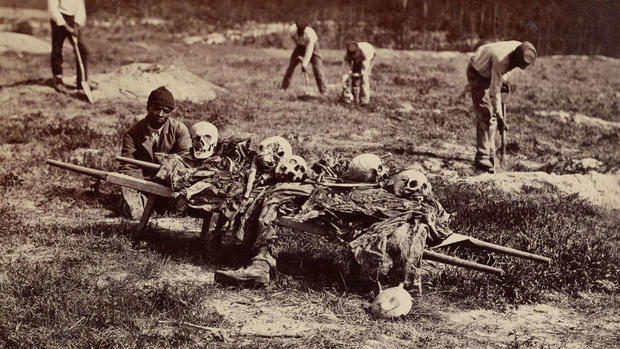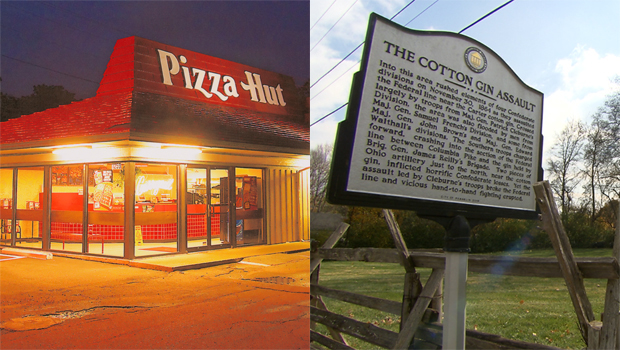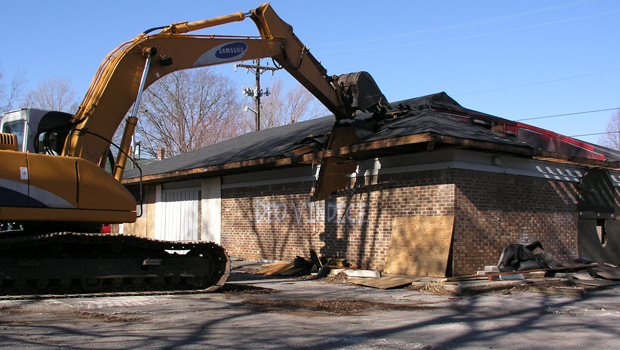The fight to reclaim America's battlefields
Some wore blue, others wore gray. Every soldier who fought in the Civil War played a role in shaping our history. So should every place where they did battle be considered hallowed ground? Here's Martha Teichner:
One hundred fifty years ago today -- November 30, 1864 -- Union and Confederate soldiers fought their way across a Tennessee field, just as re-enactors do today.
But it was no spectator sport that day.
A crippling defeat for the Confederacy, the Battle of Franklin came to be known as "Bloody Franklin." The casualties on both sides added up to almost 10,000. Nearly 1,500 of the Confederate dead are buried nearby, in the McGavock Family Cemetery at Carnton Plantation.
"Sunday Morning" first came here in 2005 to tell the story of bestselling author Robert Hicks, who made it his mission to save the Franklin battlefield.
"In a sense, you can say that this battle, these boys, the Union boys, all died to basically make us Americans," Hicks said then.
"When you look today at the battlefield," asked Teichner back then, "what do you see?"
"I see Targets and Hardee's and businesses," said Hicks. "We can over this next decade undo some of that."
In 2005, if you stood in the cemetery and looked over the fence to where hundreds of the soldiers died, you saw a golf course. "Hopefully, the day will come that it will be back to what it was," said Hicks.
The golf course is a park now, and Franklin has become the poster child for something almost unheard of: a major victory in the war to reclaim Civil War battlefields.
"If we'd failed on the golf course, then we would never have gone on," said Hicks today.
"Parts of them disappear every day," said James Lighthizer heads the Civil War Trust, which raises money to save endangered properties. "We guesstimate at about 30-40 acres a day because of development, so it's going pretty fast."
Gettysburg, site of the bloodiest battle ever on U.S. soil, became a national military park in 1895. But significant landmarks were left out, including Confederate General Robert E. Lee's headquarters.
Today, a motel stands next to Lee's headquarters. Teichner asked, "Is this an affront to you?"
"Yeah, it's a sacrilege," replied Lighthizer. "I mean, it's a destruction of a part of American history."
For $120 a night, you can actually stay upstairs -- that is, for a while longer. The Civil War Trust is raising $5.5 million to buy and restore the property and tear down the motel next door.
"When it comes to preserving land, it's really all about money," said Lighthizer. "There's nothing else to it. Good intentions are just that -- they get you nowhere."
According to the Civil War Trust, 42 percent of the principal battlefields have been lost, or close to it -- casualties to development.
The fights are not always black-and-white: good guys against bad guys. And Civil War sites are not the only concern.
For example, the battle over the Battle of Princeton, in New Jersey, which was fought during the American Revolution, in January 1777.
For General Washington, who hadn't won many outright victories to that point, the battle was monumental -- his counter-attack pushed the British off the hill. It built his reputation, and his leadership.
On one side, you've got Jerry Hurwitz, president of the Princeton Battlefield Society ("What they're doing is tantamount to spitting in the eye of the American people," he said).
On the other side: John Masten, representing the Institute for Advanced Study, a community of world-renowned scholars, which wants to build faculty housing on seven acres it owns on what may (or may not) be core battlefield.
Teichner asked, "How do you balance the 21st century against the 18th?"
"The view that any land over which troops moved or where any shots were exchanged is automatically to be preserved is a view that's hard to apply in Princeton," said Masten, "because so much has happened since 1777. And it's not just large residential neighborhoods, but also important institutions in the community."
So, it's the place where Albert Einstein and J. Robert Oppenheimer, the father of the A-bomb, worked -- against the father of our country, George Washington.
Who deserves to win?
Last Wednesday, Franklin, Tenn., came one demolition closer to reclaiming another big piece of its battlefield. A decade ago, it had been written off as lost. But then Franklin had a change of heart - thanks in part to Robert Hicks and lawyer Julian Bibb.
"The battlefield, which had been looked at as forgotten or, 'Gosh, it's gonna be way too expensive to do what you all are trying to do,' that took the convincing," said Bibb. "And once that began to happen, it completely changed the support we were recognizing politically, locally and statewide."
"This year we will probably have over 100,000 people come to Franklin [as] heritage tourists," said Hicks.
The worst part of the fighting was around the site of the Carter House (now a museum) and a Pizza Hut when we first came to Franklin in 2005. Since then, It's been "now you see it, now you don't" -- one property after another gone, just like Dominoes, which will be going away in January, all to make way for a 20-acre park on the reclaimed land. The price tag: $14 million, so far, from private donations, the Civil War Trust, and the city, state and federal governments.
"This is hallowed ground" said Hicks. "I don't know how to say it any other way. Something holy happened here."
Who knew that people would still be fighting the Battle of Franklin today, 150 years after the fact? The front lines then . . . are the front lines now.
More on the Civil War:
- Obama awards Medal of Honor to Civil War hero (CBS News, 11/06/14)
- Gallery: 150th anniversary of the Civil War
- Gallery: The Battle of Gettysburg
- Gallery: Civil War medicine
- Gallery: Photographs of the American Civil War
- Gallery: Women of the Civil War
For more info:
- Campaign 1776 - Effort to preserve 4.6 acres adjacent to Princeton Battlefield State Park (Civil War Trust)
- Donate to Campaign 1776
- Civil War Trust
- Follow the Civil War Trust on Twitter (@CivilWarTrust), Facebook, Flickr and Vimeo
- American Battlefield Protection Program (National Park Service)
- franklinscharge.com
- Princeton Battlefield Society
- Institute for Advanced Study, Princeton, N.J.


